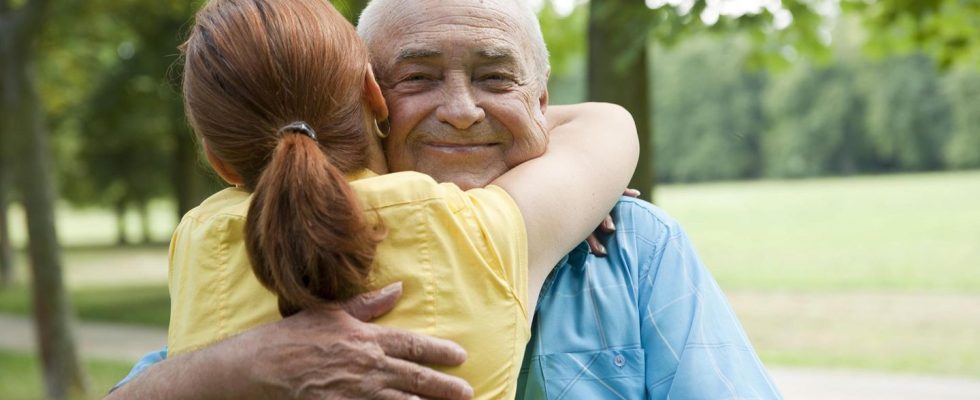Hug each other!
Today is “World Cuddle Day”: Why physical closeness is good for us
Not only important for body and soul on World Hugging Day: a loving hug
© Uwe Umstätter / Picture Alliance
A hug can release happiness hormones and increase well-being. “World Cuddle Day” on January 21st is intended to remind us that we need to be close to one another.
Humans need touch. Physical contact is important – almost like breathing air. It helps adults deal with stress and babies help them grow up. The annual “World Hugging Day” (English: National Hugging Day) on January 21st is intended to encourage us to hug each other more.
World Hugging Day: Why is hugging actually healthy?
An adult’s skin measures up to two square meters – if spread out, that would be about the size of a door. Because body and mind are closely related, touching our largest and most sensitive sensory organ triggers something in us. “Without touch, people atrophy and can become ill,” says Ute Repschläger from the Federal Association of Independent Physiotherapists (IFK).
When we are hugged, the body releases messenger substances that are popularly known as ““Happiness hormones”. Oxytocin, for example, has a calming effect, helps reduce stress and strengthens interpersonal bonds. Dopamine has a mood-enhancing effect.
Various studies have shown that the hearts of people who hug each other regularly beat more calmly, explains the therapist. People with regular physical contact also had lower stress hormone and blood pressure levels.
Children are often hugged, older people less so – why?
“Children naturally seek physical closeness to cope with stress,” explains Martin Grunwald, head of the haptics research laboratory at the University of Leipzig. Childhood in particular is an “important contact time”. Repschläger adds that this contact has a fundamental influence, especially in early childhood development.
Older people in particular often live with a touch deficit. There is often only sufficient contact while the partner is still alive. Grunwald: “The young people can’t even imagine the disembodiment of an old person.”
Not everyone has friends or family to hug. Does it make a difference if a stranger hugs me?
“The calming aspects of a quick hug are quicker and stronger with a familiar person,” explains Grunwald. The touch of a friendly, close person is particularly good because it is associated with trust, says Repschläger. Even cuddling with your pet has an effect on the “happiness hormones”.
But a feeling of happiness can also arise when hugged by strangers. The Leipzig haptics researcher therefore praises initiatives such as the “Free Hugs” movement, in which strangers offer free hugs on the street: “No one comes out with distorted facial features. People are smiling and happy.”
But it always depends on the type of touch: physical touch in a crowded train, for example, tends to cause discomfort in many people, explains Repschläger. Even with a nursing staff, for example, a relationship of trust must first be established so that the contact can really be beneficial.
Do we hug each other too rarely?
There is no general answer to this question. How much physical closeness someone needs can vary greatly. Some people simply want to allow little or no closeness. Repschläger generally advises people to approach each other more often: “Physical touch is very important for everyone, regardless of age.”

Watch the video above: A buried baby is rescued alive from the rubble. The clip is currently circulating on X, formerly Twitter, along with the claim that it is recent footage from Gaza. But what does it mean? Is the recording real or fake?
Note: This article comes from the stern archive

